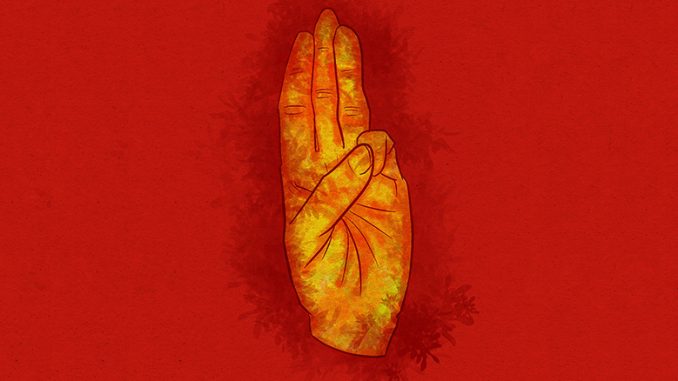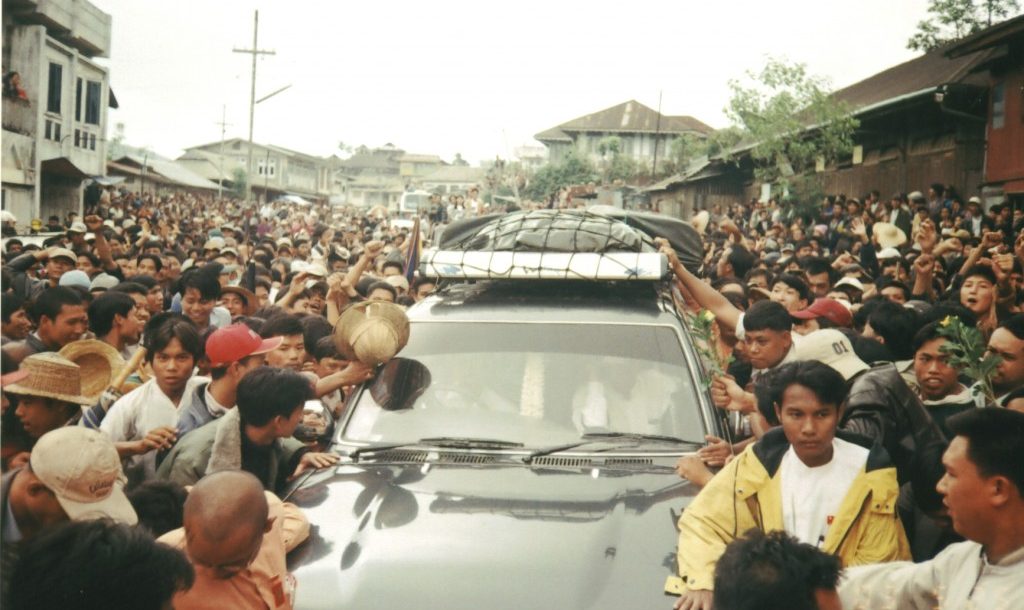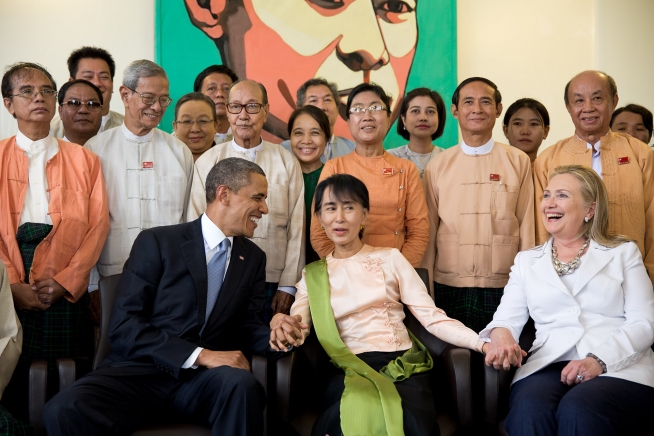Is the US Supporting Myanmar’s Democratic Resistance or Failing to Walk the Talk?
In its Summit for Democracy 2023 speech, US President Joe Biden praised 'the bravery of Ukrainians', but failed to even mention about Myanmar's democratic resistance. It shows the US pursues its core interests, not values.
 London: On March 30, the US patronised its Summit for Democracy 2023 in Seoul, South Korea, and invited Prime Minister Narendra Modi to address the gathering. On the eve of the summit, US President Joe Biden delivered his speech about the state of democracies around the world from Washington.
London: On March 30, the US patronised its Summit for Democracy 2023 in Seoul, South Korea, and invited Prime Minister Narendra Modi to address the gathering. On the eve of the summit, US President Joe Biden delivered his speech about the state of democracies around the world from Washington.
The US praised "the bravery of Ukrainians" who have been fighting against Russia's attempts to crush democracy in Ukraine. It also spoke about the "unprecedented unity" from other democracies "condemning Russia’s brutal war of aggression against Ukraine".
However, the US didn't even bother to mention that on the other side of the world, Myanmar is rising up against the authoritarian onslaught on their fragile democratic transition.
The State Administration Council, which is the junta currently ruling Myanmar, killed over 3,000 people and made 20,000 arrests over the last two years since the coup of 2021.
As someone who was educated in the US in the late 1980s, I cut my political teeth as a grassroots activist and lived and worked there for 17 years. I have known what Noam Chomsky calls "supreme hypocrisy" of US governments for several decades. Democrats or Republicans, Washington talks the talk of democracy, human rights and freedom, but it typically fails to walk the talk.
This absence of genuine support and solidarity for the pro-democracy Burmese opposition on the part of the US policymakers – and not simply the hypocrisy of their government as a whole – was one of the principal reasons I left the country in 2005.
(The other instance of US's hypocrisy was its illegal and immoral second invasion of Iraq, accompanied by numerous war crimes during the US occupation of that devastated society.)
Completely enamoured with the rhetoric of the US as “the land of the free”, I went there as a student in my 20s, a month before the 8.8.88 Uprising (or the 1988 uprising) in Myanmar.
But by the second invasion of Iraq, my illusions of “democracy in America” and its support for the global democratic movement were irreversibly shattered.
During my years as a grassroots organiser – first, as a student activist, and later, as a start-up academic – I had interacted with many American institutions and individuals who had led them or worked there, from city councils, state legislatures, churches, and student organisations to the White House, US State Department, Congress, US government funding agencies, such as the US Institute of Peace and the National Endowment for Democracy, and numerous think tanks of all ideological stripes and colours.
There were so many wonderful Americans who cared, and who wanted to do the right thing: support democratic movements around the world.
My old Free Burma Coalition colleague, Naw May Oo, another American-educated refugee, who now advises the Karen National Union (KNU), and I were able to meet some of the straight-talking Americans who were part of Washington’s Burma policy circles. They gave us an equivalent of a shock therapy when they told us very bluntly, that we could not take the US government's pro-democracy rhetoric at face value. A few deserve a mention for their honesty.
 After the Depayin massacres of spring 2003, during which National League for Democracy leader Daw Aung San Suu Kyi and her deputy U. Tin Oo escaped the botched assassination, we met at a Senate office with the two key aides to the chair and ranking member of the US Senate Foreign Relations Committee, Senators Richard Lugar (Republican, Indiana) and John Kerry (Democrat, Massachusetts), to see if there could be stronger support for the flagship NLD opposition in the heartlands and the ethnic armed organisations in the conflict zones.
After the Depayin massacres of spring 2003, during which National League for Democracy leader Daw Aung San Suu Kyi and her deputy U. Tin Oo escaped the botched assassination, we met at a Senate office with the two key aides to the chair and ranking member of the US Senate Foreign Relations Committee, Senators Richard Lugar (Republican, Indiana) and John Kerry (Democrat, Massachusetts), to see if there could be stronger support for the flagship NLD opposition in the heartlands and the ethnic armed organisations in the conflict zones.
Their response?
One of them said to us, “If Aung San Suu Kyi were assassinated by the junta, (Burmese democrats) would get a statement of condemnation from the United States government.” The other senator said, “You might also get a memorial service at the National Cathedral.”
[Given Aung San Suu Kyi’s moral standing in the world today, because of her ignominious defence of the indefensible(the Rohingya genocide) at the International Court of Justice in December 2019, even a memorial service in honour of the 77-year old lady in captivity seems inconceivable.]
Matthew P. Daley, former Korean War veteran, who was then Deputy Assistant Secretary of State in the East Asia Bureau within the State Department, was far more specific and blunt. The US official told me, “I can’t conscience my government’s empty pro-democracy rhetoric. But in reality, we let pro-democracy dissidents be mowed down by authoritarian regimes.”
He gave an example of the crushed Hungarian uprisings against the Soviet-backed regime in Budapest during the Eisenhower presidency in 1956. Over 20,000 Hungarian democratic activists were slaughtered and/or otherwise persecuted, and Washington’s support, which was never intended to be real, never came.
He recounted to me that in his meetings with his counterparts in Beijing, how he dropped the official script of Washington’s pro-democracy concerns for Burma, in hopes that the Chinese Communist Party leadership may get the message that the giant neighbour had nothing to fear of the US backing for the Burmese democratic opposition. For there was no such thing!
Since the Hungarian uprisings, there have been too many cases of pro-democratic and pro-Western movements and governments that Washington abandoned. Among them were Myanmar’s neighbours, namely South Vietnam and Cambodia. The latest was Afghanistan that fell under the Taliban.
You may be friends with US officials, who are honest and helpful. But their government is not a friend of your democratic struggle, unless supporting your resistance advances America’s core interests (read Ukraine).
This was a rude awakening for me then, which in turn compelled me to seek an alternative of finding ways to reconcile with the oppressive military leadership. In the absence of real support from the US in particular and the liberal West in general, I sought to explore ways to help end the country’s vicious cycle of violence and counter-violence, repression and resistance. My efforts came to nothing.
Now I feel I am back to where I started some 20 years ago when I split with Suu Kyi-led flagship opposition movement and advocated the deeply unpopular stance, “we must talk to the generals”. Today I know that "dialogue", inclusive or not, with the military killers is inconceivable and widely unpopular with the public in Myanmar.
The US government pursues its core interests, not values
 I knew that Washington would sell us, Burmese democrats, down the river. Then President Barack Obama and his Secretary of State Hilary Clinton had visited Suu Kyi’s fabled colonial mansion in Rangoon, with global publicity and fanfare.
I knew that Washington would sell us, Burmese democrats, down the river. Then President Barack Obama and his Secretary of State Hilary Clinton had visited Suu Kyi’s fabled colonial mansion in Rangoon, with global publicity and fanfare.
However, they removed her only leverage: financial sanctions against her military captor.
According to Obama’s National Security Adviser Ben Rhodes, in her meeting with the US President at the Oval Office in 2013, the Burmese opposition leader asked Obama to retain financial sanctions. She wanted to use them as bargaining chips in her dealings with the Burmese generals. But beholden to the interests of the US corporations, Obama offered Suu Kyi an all-or-nothing option.
The US businesses could not wait to enter Myanmar as the virgin economy where the Chinese, Singaporean, Thais, Malaysians, South Koreans and Taiwanese had already built toeholds during these years of US sanctions.
To labour the obvious, the world’s most powerful government, the US government, would do anything to pursue its core interests, not values. According to the US Congressional Research Services and other studies, the US has waged over 300 wars and invasions, declared and undeclared wars, “legal” (per the UN Security Council) and illegal invasions, covert and overt, sanctions or lifted them, at their convenience.
There just isn’t enough US interests for Washington to support the Burmese democratic resistance.
Two years since the universally opposed military coup of February 2021, the US has only offered the nationwide democratic resistance, made up of Gen Z fighters and several major ethnic resistance organisations (for instance, the Karen National Union, Chin National Front, and Karenni Progressive People’s Party), “notional” support, according to former US Ambassador to Burma Scot Marciel.
Moreover, the Russian invasion of Ukraine and the reactive “unity of the West” in support of Ukrainian people’s defence for their democratic rights have stripped bare Washington’s pro-democracy rhetoric.
Rethinking alliances
Some 25 years ago, I met James Woosley, former CIA director and an early proponent of the regime change in Baghdad, at a close American friend’s book launch party in Washington, D.C. I asked him for advice on the subject of removing the Burmese dictatorship back home. He said, “You need a lot of money!” And he knew what he was talking about. No resistance or "regime change", in the neoconservative terminology, could be successfully undertaken on empty stomachs, with poor arms, or without material support of a state actor, from the American Revolution of 1776 to Africa's anti-apartheid struggle.
 Within seven days of the Myanmar coup two years ago, US President Biden was seen on live TV news, talking tough against the Burmese coup regime while proceeding to announce his executive decision to freeze $1 billion that belongs to Myanmar state (that is, people) as a first step towards supporting Myanmar’s pro-democracy public.
Within seven days of the Myanmar coup two years ago, US President Biden was seen on live TV news, talking tough against the Burmese coup regime while proceeding to announce his executive decision to freeze $1 billion that belongs to Myanmar state (that is, people) as a first step towards supporting Myanmar’s pro-democracy public.
Like Woosley, Biden, too, knows very well how costly war and resistance-financing is. Senator Biden routinely voted to fund Israel, the largest recipient of US military assistance, for 30 years and supported the invasions of Iraq by the two Bushes.
And yet as President, Biden refuses to unfreeze that $1 billion for use by the Burmese democratic resistance.
In his remarks at the Summit for Democracy delivered in Washington on March 29, Biden singled out “the unprecedented unity we’ve seen from democracies condemning Russia’s brutal war of aggression against Ukraine and standing in solidarity with the brave Ukrainian people as they defend their democracy”. And yet the man who froze $1 billion and, only two years ago, promised action to support the Burmese people who too defend their democracy, however flawed, chose not to even make an obligatory mention about them.
For revolutionary movements to succeed they need friends, particularly “frontline states”, that is, neighbours adjacent to the theatres of resistance. To gain support and solidarity from neighbours is of paramount importance, particularly in light of the complete absence of real support from “democracies of the world”.
Admittedly, none of Burma’s neighbours has shown any interest or will to partner with or recognise the National Unity Government (NUG), or support the democratic resistance in the country. Beijing, on the other hand, has shown the strongest signals of support for the military administration since last year’s coup.
We must rethink radically our meaningless "alliances" with, or more accurately, dependency, on the liberal West, particularly Washington. Our resistance needs to start considering our own Asian neighbours, such as China and India, and articulate our non-aligned stance. We must spell out publicly and loudly that our democracy movement and federalist movements mean no threat to the neighbours' interests.
In the world heading towards multipolarity – as opposed to the unipolar world where the US has served as the global hegemon – non-alignment is both a moral imperative and a strategic necessity.
 Maung Zarni is Co-founder of the Forces of Renewal South East Asia (www.forsea.co). He has had more than 30 years of experience in international affairs around Myanmar’s democratisation. He is the author of Myanmar’s Enemy of the State Speaks and co-author of Essays on Myanmar’s Genocide of Rohingyas. This article first appeared in The Wire at: https://m.thewire.in/article/world/is-the-us-supporting-myanmars-democratic-resistance-or-failing-to-walk-the-talk
Maung Zarni is Co-founder of the Forces of Renewal South East Asia (www.forsea.co). He has had more than 30 years of experience in international affairs around Myanmar’s democratisation. He is the author of Myanmar’s Enemy of the State Speaks and co-author of Essays on Myanmar’s Genocide of Rohingyas. This article first appeared in The Wire at: https://m.thewire.in/article/world/is-the-us-supporting-myanmars-democratic-resistance-or-failing-to-walk-the-talk